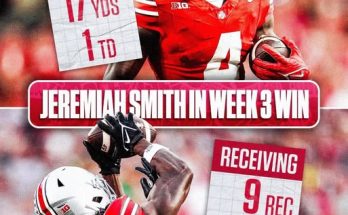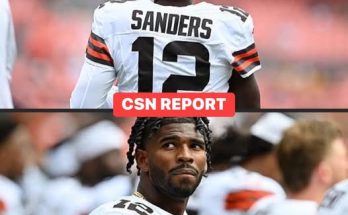Freshman offensive tackle David Sanders Jr., one of the most highly touted recruits in Tennessee’s 2024 signing class, is reportedly not expected to suit up for the Volunteers when they take on Georgia, according to Pete Nakos and On3’s Chad Lownsdale. The news continues what has been a frustrating stretch for both Sanders and the Tennessee coaching staff, as the former five-star prospect is set to miss his third consecutive game due to a shoulder injury that has lingered longer than initially anticipated. For a program that has worked hard to build depth and size in the trenches to compete against the physical dominance of the SEC, losing a player of Sanders’ caliber—even as a freshman—represents both a short-term blow and a long-term concern about his development curve.
Sanders arrived in Knoxville this summer as one of the most heralded offensive line prospects in the country. A consensus top-five national recruit and the highest-ranked signee in Tennessee’s 2024 class, he was viewed as a potential day-one contributor despite the challenges that freshmen typically face when adjusting to SEC football. At 6-foot-6 and nearly 300 pounds, with elite athleticism for his size, Sanders was projected not only as a future NFL talent but also as a player capable of immediately pushing veterans for playing time. Tennessee’s coaching staff, led by head coach Josh Heupel and offensive line coach Glen Elarbee, praised his maturity, work ethic, and physical tools during fall camp, signaling that while he might not be a full-time starter from day one, he would certainly have a role in the rotation.
However, the physical nature of college football, especially in the SEC, can take a toll even on the most gifted prospects. Sanders sustained a shoulder injury earlier in the season, and what initially appeared to be a minor setback has now kept him sidelined for multiple weeks. Missing three straight games at this stage not only interrupts his developmental timeline but also forces Tennessee to shuffle its offensive line rotation against some of the toughest defenses in the country. The fact that the third game he will miss is against Georgia—the two-time national champions who boast perhaps the deepest defensive line rotation in America—only highlights the significance of his absence.
From a purely tactical perspective, Tennessee’s offensive line depth will be tested. Georgia thrives on creating pressure with its defensive front, using a mix of power and speed to collapse pockets and stuff running lanes. Against such a formidable unit, having a physically dominant tackle like Sanders available, even in a limited role, would have given Tennessee more flexibility in handling matchups. Without him, the Volunteers are forced to rely more heavily on veteran players and backups who may not have the same upside or ability to handle Georgia’s elite edge rushers. This makes life more difficult not only for Tennessee’s quarterbacks but also for the running game, which has been a central component of Heupel’s offensive strategy.
For Sanders personally, the extended absence raises questions about how much game experience he will be able to accumulate during his freshman year. Offensive line is a position where live reps are invaluable, as technique, timing, and chemistry with fellow linemen cannot be fully replicated in practice. Missing multiple games in the heart of the season delays that process and could potentially slow his progression from prized recruit to reliable starter. Tennessee’s coaching staff has made it clear that they see Sanders as a cornerstone for the future, but availability is always the first step toward fulfilling that potential. The longer he remains sidelined, the greater the challenge in ensuring he develops as expected.
There is also the broader narrative of how Tennessee is attempting to close the gap with programs like Georgia and Alabama. Recruiting elite talent like Sanders is a critical piece of that puzzle, but developing those players and keeping them healthy is equally important. Georgia, for example, has built its dynasty on consistently fielding dominant offensive and defensive lines, with multiple NFL-caliber players rotating in and out every season. Tennessee’s ability to compete at that level depends in large part on turning prospects like Sanders into polished, game-ready contributors. While one freshman missing a few games is not a program-defining crisis, it does highlight the thin margin for error when trying to climb the SEC ladder.
For Tennessee fans, the frustration is understandable. Much of the offseason excitement around the program was tied to the influx of talent from the 2024 class, with Sanders at the forefront as a player who could potentially make an immediate impact. Seeing him sidelined for nearly a month due to injury tempers some of that enthusiasm and serves as a reminder that even top recruits face setbacks. Injuries are an unfortunate reality of the sport, and managing them effectively is a key responsibility for any coaching staff. Tennessee’s medical and training staff will no doubt be cautious with Sanders, prioritizing his long-term health and career over any short-term gains. Still, the timing of his absence—right as Tennessee enters a critical stretch of conference play—adds an extra layer of difficulty.
In Sanders’ absence, the Volunteers have leaned on other players to fill the void. Veterans have shouldered the bulk of the snaps, while younger linemen lower on the depth chart have been forced into bigger roles. This trial by fire could ultimately benefit the team by creating more depth and experience across the line, but it also comes with growing pains. Against a team like Georgia, those growing pains can be magnified, as any breakdown in protection or blocking execution is quickly exploited by one of the most talented defenses in the nation. Tennessee’s offensive staff will need to be creative in designing schemes that protect the line and mitigate the absence of a player like Sanders, perhaps by utilizing quicker passing plays, additional tight end help in blocking, or misdirection in the run game.
The mental aspect of the injury for Sanders should not be overlooked either. For a freshman entering the college game with enormous expectations, being forced to watch from the sidelines can be difficult. Athletes of his caliber are used to being on the field, contributing, and dominating. Adjusting to a supporting role while managing an injury requires resilience and patience. Tennessee’s coaches and teammates will play a crucial role in keeping him engaged, ensuring that he continues to learn the playbook, refine his technique in whatever ways possible, and remain a part of the team’s culture despite not being able to take snaps. The way Sanders handles this early adversity could shape not only his freshman year but also the trajectory of his entire college career.
It is worth noting that Tennessee’s investment in Sanders was not only about 2024 but about the bigger picture of building sustained success. Offensive tackles with his combination of size, athleticism, and pedigree do not come around often. If he can recover fully and get back on the field later this season, he still has ample opportunity to showcase his talent and begin carving out his role as a future anchor for the offensive line. The immediate setback is disappointing, but it does not diminish his long-term ceiling. Tennessee has every incentive to prioritize his recovery and ensure that when he does return, he is in a position to stay healthy and productive.
In the meantime, Tennessee will continue to navigate the brutal gauntlet of SEC play without one of its most promising young players. The matchup against Georgia looms large, not only as a test of where the program stands but also as a reminder of the level Tennessee must consistently reach to challenge for championships. Sanders’ absence underscores just how much depth and resilience are required to compete at that level. For now, the Volunteers will have to make do without him, relying on veterans, adjustments, and sheer determination to hold their own in the trenches.
As for Sanders, the path forward remains clear: heal, learn, and prepare to return stronger. Freshman seasons are often filled with ups and downs, and while this injury represents an unfortunate low point, it is also an opportunity for growth. By staying mentally sharp and physically diligent in his recovery, Sanders can still turn this season into a valuable stepping stone in his journey. Tennessee’s fans, coaches, and teammates will undoubtedly be eager to see him back in uniform, fulfilling the promise that made him one of the most coveted recruits in the country. Until then, his absence will be felt—most notably in battles like the upcoming clash against Georgia, where every ounce of talent and toughness is required.



